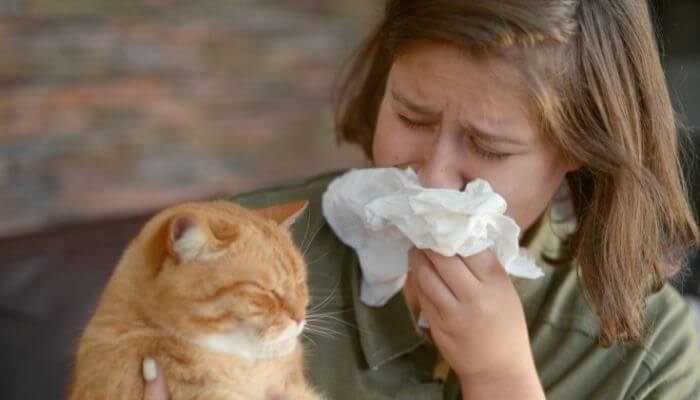Yes.
Cat allergies can be developed at any age depending on a number of various factors, including exposure to pet dander, hair, or other even cat saliva.
People with an overly sensitive immune system are more likely to develop allergies all throughout their life.
Dan – the owner of this site, inconveniently developed a cat allergy aged 33!
Contents
Symptoms Of Cat Allergies In Adults
It can sometimes take years and years for you to develop an allergy to cats in particular or pets in general.

The most common clinical signs that you might experience if you have indeed become allergic to cats are related to the respiratory system.
As such, you might experience respiratory distress, wheezing, congestion, sneezing, or a runny nose, along with inflammation and irritation of your eyes and nose.
Other signs include:
- Persistent coughing
- Facial pressure
- Chest pain
- Itchiness on your face or neck
- Oral swelling
What’s extremely interesting about any of these symptoms, including those that are indicative of an asthma episode, is that they can sometimes show up at least 30 minutes after you have been exposed to the allergen.
For example, if you’re known to have asthma, but you don’t know of any allergy to cats you might have and you’re older than 18, you might think that going to your friend’s place, where cats reside, is safe.

Unfortunately, that is not always the case.
Asthma attacks can happen quite suddenly and if you do not have your inhaler with you, you will need to be taken to the hospital by someone as quickly as possible.
Reasons Why You May Suddenly Develop A Cat Allergy
Cat allergies aren’t as simple as you might think they are.
Most people tend to think that what we, as humans, are particularly sensitive to is cat hair.
But the truth is that cats release a variety of skin and cat products, which are generally known as dander.

Dander can be made up of anything from dead skin cells, dandruff, or dirt that your cat might have on their body, and sometimes very small hairs.
Long-haired cats produce more dander and more hairs, so they leave more throughout the house.
As much as you might clean your home, you might never be able to get rid of all dander, so there will be a potential allergen there waiting for your immune system to become more vulnerable.
Other people can be allergic to cat saliva or cat urine, and although these types of allergies are somewhat less common, they can occur later on in a person’s life.
How To Test For Cat Allergies
If you are not a cat owner and you tend to have flare-ups each time you visit your friends who are also cat owners, that can be a pretty good indication of an allergy.
However, specialised tests now exist, and your physician can recommend you to an allergologist that can perform one and that can clearly diagnose you.
The way the test works is that a very small portion of a cat allergen extract is put in contact with your skin so that it produces (or not) a reaction at the site.
People who tend to have allergies to various factors are usually more likely to have pet allergies, too, so they should get tested so that they know what to avoid.
What Causes Cat Allergies?
Cat dander is typically at the root of this health complication, and the worst thing about it is that it’s oftentimes invisible.
A cat can leave it in places such as on carpets, upholstered furniture, stairs, or even the sides of the walls that they rub their cheeks and chins on.

So, the best answer to the question would be cat dander or any other cat-related allergens, along with an overly sensitive immune system.
People who develop allergies are usually outfitted with immune systems that perceive factors like cat dander as potential threats, even if they might not put other people’s health in danger.
Allergic reactions are actually the result of the body trying to protect itself against this potential abuser.
Can You Become Allergic To Cats While Pregnant?
Yes.
While it is true that cat allergies are more likely to affect pregnant people who are otherwise generally predisposed to allergies in general, that doesn’t mean that they can’t happen in people who have never been allergic to anything before.

Because of the physiological changes that pregnancy causes to someone’s body, allergies are more common during this period.
Consequently, we recommend avoiding coming in contact with cats or other pets throughout your pregnancy, especially if you don’t own one.
How To Prevent Cat Allergies
First of all, most people who are allergic to cats rarely experience severe symptoms, such as those that can be related to anaphylactic shock.
That’s how some individuals, despite them having cat allergies, can live with cats with some minor changes.
It all depends on the severity of the allergy.
If you have allergic asthma, you should not own a pet, especially if a test has clearly revealed that you are allergic to their dander.
If you have a mild allergy, the symptoms can be managed with several medications that your physician can recommend.
Here are some other tips for preventing cat allergy flare-ups:
- Don’t let your cat into your bedroom so that it remains cat dander-free
- Wash your hands after playing or petting your cat
- Use an air filter (preferably a HEPA one)
- Try to keep your house carpet/upholstery-free so that none of the surfaces retain cat dander
- Thoroughly clean your home every week, including all the nooks and crannies where cat dander might remain
- Use a HEPA vacuum cleaner once every several days to reduce the amount of allergens on your floors
- Wear a mask while dusting or vacuuming to prevent any particles from reaching your face/respiratory system







Leave a Comment